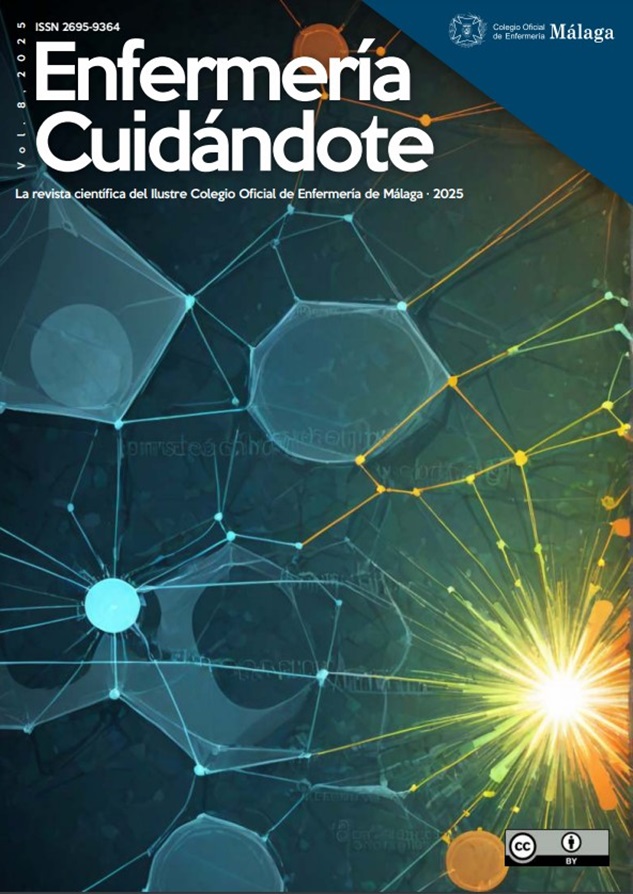La epigenética y su influencia en la diabetes gestacional, preeclampsia y crecimiento intrauterino retardado. Una revisión de la literatura
DOI:
https://doi.org/10.51326/ec.8.7462896Palabras clave:
Diabetes Gestacional, Embarazo, Memoria Epigenética, Preeclampsia, Relaciones Materno-Fetales, Retardo del Crecimiento FetalResumen
Introducción: La epigenética estudia la interacción entre genes y ambiente, influenciando en la salud y el desarrollo de enfermedades. Durante el embarazo, estos mecanismos epigenéticos pueden predisponer a enfermedades en la descendencia. La diabetes gestacional, la preeclampsia y el crecimiento intrauterino retardado (CIR), están relacionadas con mecanismos epigenéticos, lo que resalta la influencia del entorno prenatal en la salud futura del feto a largo plazo.
Objetivos: Conocer el concepto de epigenética, su relación en la gestación y analizar la correlación entre la epigenética y la diabetes gestacional, preeclampsia y crecimiento intrauterino retardado.
Metodología: Se realizó una investigación de evidencia disponible, se utilizaron las principales bases de datos y metabuscadores, recurriendo a descriptores de Ciencias de la Salud DESC y Medical Subject Headings MeSH, los criterios de inclusión fueron: artículos científicos relacionados con el tema a estudio publicados entre 2014 y 2024, en idioma español e inglés y de calidad científica.
Resultados: Tanto la diabetes gestacional, la preeclampsia y el CIR están estrechamente relacionados con mecanismos epigenéticos, los cuales pueden aumentar la susceptibilidad para que el feto presente enfermedades cardiovasculares, metabólicas y del desarrollo tanto a corto como a largo plazo.
Discusión: La identificación temprana de biomarcadores epigenéticos pueden mejorar la prevención de riesgos y el tratamiento de complicaciones, beneficiando la salud materno-fetal.
Conclusión: Es importante que las matronas y otros profesionales conozcan esta área para promover hábitos saludables y proporcionar educación para la salud basada en evidencia. Avanzar en la investigación permitirá desarrollar estrategias preventivas y mejorar la salud materno-fetal.
Descargas
Citas
1. Nicoglou A. Waddington's epigenetics or the pictorial meetings of development and genetics. Hist Philos Life Sci. 2018;40(4):61. https://doi.org/10.1007/s40656-018-0228-8
2. Bedregal P, Shand B, Santos MJ, Ventura-Juncá P. Aportes de la epigenética en la comprensión del desarrollo del ser humano. Rev Méd Chile. 2010;138(3):366-72. http://dx.doi.org/10.4067/S0034-98872010000300018
3. Delgado Morales R, Roma-Mateo C. La epigenética. Cómo el entorno modifica nuestros genes. Barcelona: RBA; 2019.
4. Cavagnari BM. Regulación de la expresión génica: cómo operan los mecanismos epigenéticos. Arch Argent Pediatr. 2012;110(2):132-6. https://www.sap.org.ar/docs/publicaciones/archivosarg/2012/v110n2a08.pdf
5. García R, Ayala PA, Perdomo SP. Epigenética: definición, bases moleculares e implicaciones en la salud y en la evolución humana. Rev Cien Salud. 2012; 10(1): 59-71. Disponible en: https://revistas.urosario.edu.co/index.php/revsalud/article/view/2020 [Consultado 11-11-2024]
6. Barua S, Junaid MA. Lifestyle, pregnancy and epigenetic effects. Epigenomics. 2015;7(1):85-102. https://doi.org/10.2217/epi.14.71
7. Ustianowski Ł, Udzik J, Szostak J, Gorący A, Ustianowska K, Pawlik A. Genetic and Epigenetic Factors in Gestational Diabetes Mellitus Pathology. Int J Mol Sci. 2023;24(23):16619. https://doi.org/10.3390/ijms242316619
8. Maduro MR. Epigenetic Role in Hypertensive Disorders of Pregnancy. Reprod Sci. 2017;24(11):1481. https://doi.org/10.1177/1933719117734934
9. Ladd-Acosta C, Vang E, Barrett ES, Bulka CM, Bush NR, Cardenas A, et al. Environmental Influences on Child Health Outcomes Program. Analysis of Pregnancy Complications and Epigenetic Gestational Age of Newborns. JAMA Netw Open. 2023;6(2):e230672. https://doi.org/10.1001/jamanetworkopen.2023.0672
10. Dalfrà MG, Burlina S, Del Vescovo GG, Lapolla A. Genetics and Epigenetics: New Insight on Gestational Diabetes Mellitus. Front Endocrinol (Lausanne). 2020;11:602477. https://doi.org/10.3389/fendo.2020.602477
11. Franzago M, Fraticelli F, Stuppia L, Vitacolonna E. Nutrigenetics, epigenetics and gestational diabetes: consequences in mother and child. Epigenetics. 2019;14(3):215-35. https://doi.org/10.1080/15592294.2019.1582277
12. Organización Mundial de la Salud. Ginebra: Organización Mundial de la Salud; 2024. Diabetes; 14 de noviembre de 2024. Disponible en: https://www.who.int/es/news-room/fact-sheets/detail/diabetes [Consultado 19-11-2024]
13. Peguero A, Mazarico E, Hernández S, Meler E, Ferrer P, Gómez-Roig D, et al. Protocolo: Hipertensión y Gestación. Barcelona : Fetal Medicine Barcelona; 2024. Disponible en: https://fetalmedicinebarcelona.org/protocolos/protocolo-hipertension-y-gestacion/ [Consultado 19-11-2024]
14. Ashraf UM, Hall DL, Rawls AZ, Alexander BT. Epigenetic processes during preeclampsia and effects on fetal development and chronic health. Clin Sci (Lond). 2021;135(19):2307-27. https://doi.org/10.1042/cs20190070
15. Salmeri N, Carbone IF, Cavoretto PI, Farina A, Morano D. Epigenetics Beyond Fetal Growth Restriction: A Comprehensive Overview. Mol Diagn Ther. 2022;26(6):607-26. https://doi.org/10.1007/s40291-022-00611-4
16. Meler E, Mazarico E, Gómez L, Peguero A, Marimón E, Martínez J, et al. Protocolo: Defectos del crecimiento fetal. Barcelona: Fetal Medicine Barcelona; 2024. Disponible en: https://fetalmedicinebarcelona.org/protocolos/protocolo-defectos-del-crecimiento-fetal/ [Consultado 19-11-2024]
17. Kitsiou-Tzeli S, Tzetis M. Maternal epigenetics and fetal and neonatal growth. Curr Opin Endocrinol Diabetes Obes. 2017;24(1):43-6. https://doi.org/10.1097/med.0000000000000305
18. Medina-Bastidas D, Guzmán-Huerta M, Borboa-Olivares H, Ruiz-Cruz C, Parra-Hernández S, Flores-Pliego A, et al. Placental Microarray Profiling Reveals Common mRNA and lncRNA Expression Patterns in Preeclampsia and Intrauterine Growth Restriction. Int J Mol Sci. 2020;21(10):3597. https://doi.org/10.3390/ijms21103597
19. Valencia-Ortega J, Saucedo R, Sánchez-Rodríguez MA, Cruz-Durán JG, Martínez EGR. Epigenetic Alterations Related to Gestational Diabetes Mellitus. Int J Mol Sci. 2021;22(17):9462. https://doi.org/10.3390/ijms22179462
20. Zhu W, Shen Y, Liu J, Fei X, Zhang Z, Li M, et al.. Epigenetic alternations of microRNAs and DNA methylation contribute to gestational diabetes mellitus. J Cell Mol Med. 2020;24(23):13899-912. https://doi.org/10.1111/jcmm.15984
21. Lizárraga D, García-Gasca A. The Placenta as a Target of Epigenetic Alterations in Women with Gestational Diabetes Mellitus and Potential Implications for the Offspring. Epigenomes. 2021;5(2):13. https://doi.org/10.3390/epigenomes5020013
22. Mora-Janiszewska O, Faryniak-Zuzak A, Darmochwał-Kolarz D. Epigenetic Links between Microbiota and Gestational Diabetes. Int J Mol Sci. 2022;23(3):1831. https://doi.org/10.3390/ijms23031831
23. Osman E, Franasiak J, Scott R. Oocyte and Embryo Manipulation and Epigenetics. Semin Reprod Med. 2018;36(3-04):e1-e9. https://doi.org/10.1055/s-0039-1688801
24. Bankole T, Winn H, Li Y. Dietary Impacts on Gestational Diabetes: Connection between Gut Microbiome and Epigenetic Mechanisms. Nutrients. 2022;14(24):5269. https://doi.org/10.3390/nu14245269
25. Ou XH, Zhu CC, Sun SC. Effects of obesity and diabetes on the epigenetic modification of mammalian gametes. J Cell Physiol. 2019;234(6):7847-55. https://doi.org/10.1002/jcp.27847
26. Kaur M, Kaur R, Chhabra K, Khetarpal P. Maternal candidate gene variants, epigenetic factors, and susceptibility to idiopathic recurrent pregnancy loss: A systematic review. Int J Gynaecol Obstet. 2023;162(3):829-41. https://doi.org/10.1002/ijgo.14701
27. Joyce BT, Liu H, Wang L, Wang J, Zheng Y, Nannini D, et al. Novel epigenetic link between gestational diabetes mellitus and macrosomia. Epigenomics. 2021 Aug;13(15):1221-30. https://doi.org/10.2217/epi-2021-0096
28. Selvaraj S, Lakshmanan G, Kalimuthu K, Sekar D. Role of microRNAs and their involvement in preeclampsia. Epigenomics. 2020;12(20):1765-67. https://doi.org/10.2217/epi-2020-0281
29. Jiang L, Chang R, Liu J, Xin H. Methylation-based epigenetic studies and gene integration analysis of preeclampsia. Ann Transl Med. 2022;10(24):1342. https://doi.org/10.21037/atm-22-5556
30. Kamrani A, Alipourfard I, Ahmadi-Khiavi H, Yousefi M, Rostamzadeh D, Izadi M, et al. The role of epigenetic changes in preeclampsia. Biofactors. 2019;45(5):712-24. https://doi.org/10.1002/biof.1542
31. Meister S, Hahn L, Beyer S, Kuhn C, Jegen M, von Schönfeldt V, et al. Epigenetic modification via H3K4me3 and H3K9ac in human placenta is reduced in preeclampsia. J Reprod Immunol. 2021;145:103287. https://doi.org/10.1016/j.jri.2021.103287
32. Meister S, Hahn L, Beyer S, Paul C, Mitter S, Kuhn C, et al. Regulation of Epigenetic Modifications in the Placenta during Preeclampsia: PPARγ Influences H3K4me3 and H3K9ac in Extravillous Trophoblast Cells. Int J Mol Sci. 2021;22(22):12469. https://doi.org/10.3390/ijms222212469
33. Walsh SW, Nugent WH, Archer KJ, Al Dulaimi M, Washington SL, Strauss JF 3rd. Epigenetic Regulation of Interleukin-17-Related Genes and Their Potential Roles in Neutrophil Vascular Infiltration in Preeclampsia. Reprod Sci. 2022;29(1):154-62. https://doi.org/10.1007/s43032-021-00605-3
34. Apicella C, Ruano CSM, Méhats C, Miralles F, Vaiman D. The Role of Epigenetics in Placental Development and the Etiology of Preeclampsia. Int J Mol Sci. 2019;20(11):2837. https://doi.org/10.3390/ijms20112837
35. Norton C, Clarke D, Holmstrom J, Stirland I, Reynolds PR, Jenkins TG, et al. Altered Epigenetic Profiles in the Placenta of Preeclamptic and Intrauterine Growth Restriction Patients. Cells. 2023;12(8):1130. https://doi.org/10.3390/cells12081130
36. Giabicani E, Pham A, Brioude F, Mitanchez D, Netchine I. Diagnosis and management of postnatal fetal growth restriction. Best Pract Res Clin Endocrinol Metab. 2018;32(4):523-34. https://doi.org/10.1016/j.beem.2018.03.013
37. Xiao X, Zhao Y, Jin R, Chen J, Wang X, Baccarelli A, et al. Fetal growth restriction and methylation of growth-related genes in the placenta. Epigenomics. 2016;8(1):33-42. https://doi.org/10.2217/epi.15.101
38. Caniçais C, Vasconcelos S, Ramalho C, Marques CJ, Dória S. Deregulation of imprinted genes expression and epigenetic regulators in placental tissue from intrauterine growth restriction. J Assist Reprod Genet. 2021;38(4):791-801. https://doi.org/10.1007/s10815-020-02047-3
39. Doan TNA, Akison LK, Bianco-Miotto T. Epigenetic Mechanisms Responsible for the Transgenerational Inheritance of Intrauterine Growth Restriction Phenotypes. Front Endocrinol (Lausanne). 2022;13:838737. https://doi.org/10.3389/fendo.2022.838737
40. Sola IM, Karin-Kujundzic V, Paic F, Lijovic L, Glibo M, Serman N, et al. WNT5A, β catenin and SUFU expression patterns, and the significance of microRNA deregulation in placentas with intrauterine growth restriction. Mol Med Rep. 2023;27(2):28. https://doi.org/10.3892/mmr.2022.12914
41. Moen GH, Sommer C, Prasad RB, Sletner L, Groop L, Qvigstad E, et al. MECHANISMS IN ENDOCRINOLOGY: Epigenetic modifications and gestational diabetes: a systematic review of published literature. Eur J Endocrinol. 2017;176(5):R247-67. https://doi.org/10.1530/eje-16-1017
42. Elliott HR, Sharp GC, Relton CL, Lawlor DA. Epigenetics and gestational diabetes: a review of epigenetic epidemiology studies and their use to explore epigenetic mediation and improve prediction. Diabetologia. 2019;62(12):2171-8. https://doi.org/10.1007/s00125-019-05011-8
43. Dłuski DF, Wolińska E, Skrzypczak M. Epigenetic Changes in Gestational Diabetes Mellitus. Int J Mol Sci. 2021;22(14):7649. https://doi.org/10.3390/ijms22147649




















